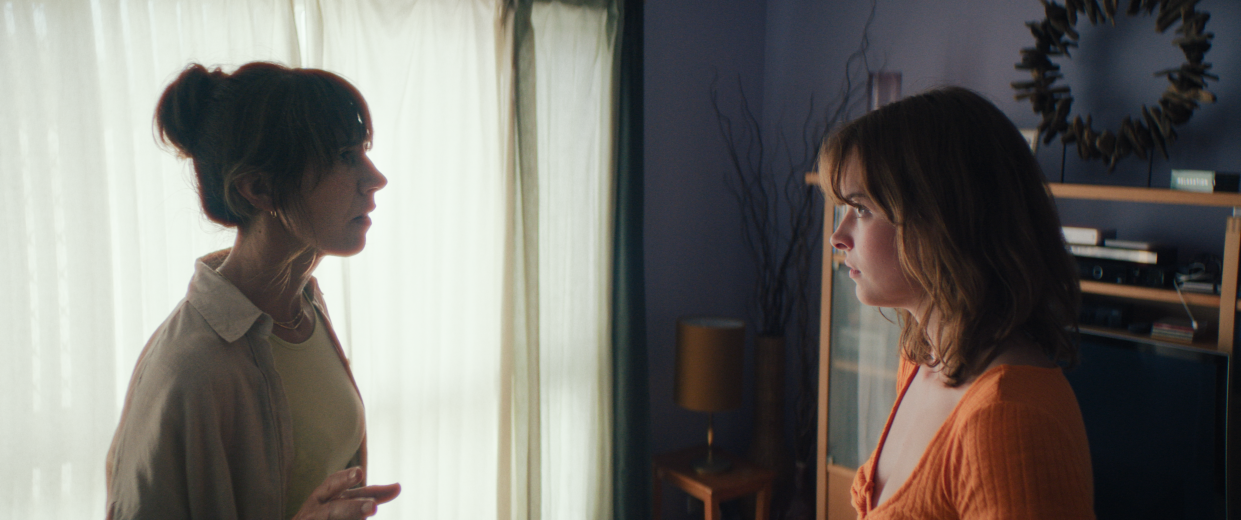‘Audrey’ Review: A Comatose Daughter Solves Everyone’s Problems in Pitch-Black Australian Comedy


When we first meet Ronnie and Cormack Lipsick (Jackie van Beek and Jeremy Lindsay Taylor), the Australian couple has respectively reached what seems like the most miserable depths of female and male existence. She feels her dreams were stolen from her when an unwanted pregnancy forced her to abandon her acting career and devote her life to traumatizing her eldest daughter. And in an equally tragic turn of events, he can’t get an erection without jerking off into a cornucopia of increasingly elaborate sex toys.
It’s a bleak state of affairs that’s only made worse by the couple’s fraying relationships with their two teenage daughters. Audrey (Josephine Blazier) responds to her mother’s demands to become “an actress or dancer or voiceover artist” with the same enthusiasm that any high schooler puts into a task being forced upon them. Audrey’s apathy for her extracurricular activities is matched only by her sister Hannah’s (Norah Lipsick) passion for wheelchair fencing — but their parents constantly pull Hannah out of classes when it’s time to pay for her sister’s acting endeavors.
More from IndieWire
“Audrey” might begin with what seems like an irreparably broken family, but you’d be surprised how fast things turn around in Natalie Bailey’s feature directorial debut. It isn’t long before Ronnie rekindles her passion for acting, Cormack finds new creative outlets and unearths his buried sexual desires, and Hannah is back on the fencing piste. All it takes is one beautiful act of divine intervention: Audrey falling off the roof and entering a coma after narrowly evading death.
Despite sharing her name with the film, Audrey is the character we spend the least time with in this pitch-black comedy. Instead, the ensemble piece becomes a satire about how much a family can perversely flourish when one cog is removed from the machine. With her comatose daughter unable to devote the proper attention to her career, Ronnie assumes the teenager’s identity and begins attending all of her classes and auditions. After a lifetime of being told she looks young enough to be her daughter’s sister, she finally gets to put the theory to the test and pursue life as a teenage idol.
Cormack finds his own sense of purpose when he begins working as a boom operator on the set of a Biblical porn studio that produces “marital aide” content for Christian couples. It isn’t long before he’s writing his own sacred smut and indulging his latent homosexuality in a torrid affair with his employer. And Hannah’s salvation is considerably more chaste but equally passionate, as the family’s lack of focus on Audrey’s reluctant entertainment career finally affords her enough time in the spotlight to flourish as a wheelchair fencing star.
While the entire ensemble benefits from Audrey’s displacement, the emotional core of the film lies in Ronnie and her abandoned Hollywood ambitions. Following in the footsteps of Bill Hader’s “Barry,” the film illustrates how taking acting classes can simultaneously be a life-affirming act of self-discovery and the most cringeworthy hobby on the planet. Bailey and screenwriter Lou Sanz wisely let the film exist in the middle of those contradictions, acknowledging that Ronnie’s youth may have been unfairly shortened without hiding from the idea that suburban acting studios are flypaper for repressed narcissists who haven’t yet come to terms with their own failures.
But the deeper, uglier truth that “Audrey” never lets us hide from is the fact that we’re not that different from Ronnie and her circle of soap opera has-beens and Biblical fluffers. Our increasingly narcissistic culture has spawned an entire subgenre of media that deals with the ways that simple domestic chores now feel like Sisyphean torture methods to many of us. And “Audrey” is the rare film that follows that individualistic mindset to its logical endpoint, exploring what happens once a character realizes their Main Character Syndrome is fundamentally incompatible with any kind of life that involves obligations to others.
Hesitant family starters have long been reassured that age and maturity would eventually lead them to a point where calm domesticity would feel just as fulfilling as the pursuit of individual glory. But in a world that seems to render such paradigm shifts less and less likely with each passing day, “Audrey” is a prescient warning that we should all treat our rooftop excursions with more caution than ever before.
Grade: B+
“Audrey” premiered at the 2024 SXSW Film & TV Festival. It is currently seeking U.S. distribution.
Best of IndieWire
Sign up for Indiewire's Newsletter. For the latest news, follow us on Facebook, Twitter, and Instagram.

